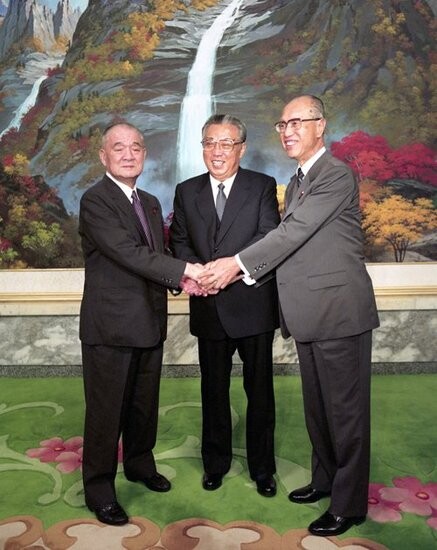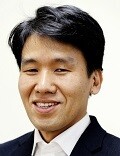hankyoreh
Links to other country sites 다른 나라 사이트 링크
[Correspondent’s column] Can North Korea-Japan relations get back on track?

On Sept. 24, 1990, a surprise visit to North Korea was paid by Shin Kanemaru, a lawmaker with Japan’s Liberal Democratic Party (LDP), and Makoto Tanabe, deputy chairperson of the Japan Socialist Party. Kanemaru, a former deputy prime minister (1986–87) who was then a major presence in the Japanese political world, met with then-North Korean leader Kim Il-sung on Sept. 26 at Mt. Myohyang. On the last day of the visit on Sept. 28, the LDP and Socialist Party issued as “three-party joint statement” with the North Korean Workers’ Party of Korea. In it, they announced that the three parties “formally apologize for the great misfortune and disaster inflicted by Japan against the people of North Korea over a period of 36 years and the losses suffered by the North Korean people over the 45 years since [WWII] and recognize that adequate compensation must be provided.”
The declaration also recognized that “the abnormal situation existing between the two countries must be mitigated and diplomatic relations established as quickly as possible,” and that “the human rights and all ethnic rights and legal status of Zainichi Koreans must be respected without discrimination, and the Japanese government must legally guarantee this.”
One factor behind Kanemura’s surprise visit to North Korea 29 years ago was the historical context of the end of the Cold War. On Sept. 30, two days after the three-party declaration, South Korea established diplomatic relations with the Soviet Union. A year later in 1991, the Soviet Union collapsed. But diplomatic relations between North Korea and Japan were never established. Critics in Japan denounced the official apology and reference to compensation in the declaration as “diplomatic capitulation.” In 1992, a member of a right-wing group shot at Kanemura while he was attending a lecture meeting. Fortunately, the bullet missed its target, but the incident is still remembered today as a shocking attack against a politician. Another reason North Korea-Japan relations have not been normalized lies within the issue of Japanese nationals abducted to North Korea.
In 2002, Pyongyang and Tokyo made another big push toward normalizing relations. Then Prime Minister Junichiro Koizumi visited Pyongyang and met with North Korean leader Kim Jong-il, who acknowledged and apologized for the Japanese abductee issue. A “Pyongyang declaration” by the two sides in 2002 made indirect reference to the issue, including a passage stating that North Korea had “confirmed that it will take suitable measures to ensure that this unfortunate issue, which arose amid an abnormal relationship between the two countries, will not happen again.” The context for this Pyongyang declaration in 2002 was the climate of hardline North Korea policies adopted by the George W. Bush administration in the US. On Jan. 29 of that day, Bush referred to Iraq, Iran, and North Korea as constituting an “axis of evil.” Hitoshi Tanaka, who spearheaded Koizumi’s visit and the Pyongyang declaration as chairperson of the Institute for International Strategy at the Japan Research Institute, recalled, “At the time, North Korea was afraid it might be attacked by the US. Part of the reason for its negotiations with Japan at the time had to do with security guarantees.”
Since last month, Japanese Prime Minister Shinzo Abe has been declaring that he hopes to meet with North Korean leader Kim Jong-un “without preconditions.” While Abe’s remarks in the past had been exclusively focused on “maximum pressure” against Pyongyang, he swiftly changed his stance after US President Donald Trump’s decision in March 2018 – mediated by South Korea – to hold a summit with the North.

In the case, the past year since the first North Korea-US summit in June 2018 has offered a keen sense of cool-headedness operating in international politics. North Korea and Japan have met in the past at times of major historical changes, but a normalization of relations has failed to come to fruition. It remains to be seen whether Abe’s proposal will be taken up. On June 7, Japanese citizens held a rally for “establishing denuclearization and peace on the Korean Peninsula and in Japan” at the outdoor music dome in Tokyo’s Hibiya Park. Calling for dialogue between the Japanese government and North Korea, rally participants insisted that Abe “look at his own feet first.” In particular, they stressed that discriminatory measures against Zainichi Koreans, such as the exclusion of Chosen Gakko schools from free high school education policies, should be eliminated.
By Cho Ki-weon, Tokyo correspondent
Please direct comments or questions to [english@hani.co.kr]

Editorial・opinion
![[Editorial] Does Yoon think the Korean public is wrong? [Editorial] Does Yoon think the Korean public is wrong?](https://flexible.img.hani.co.kr/flexible/normal/500/300/imgdb/original/2024/0417/8517133419684774.jpg) [Editorial] Does Yoon think the Korean public is wrong?
[Editorial] Does Yoon think the Korean public is wrong?![[Editorial] As it bolsters its alliance with US, Japan must be accountable for past [Editorial] As it bolsters its alliance with US, Japan must be accountable for past](https://flexible.img.hani.co.kr/flexible/normal/500/300/imgdb/original/2024/0417/6817133413968321.jpg) [Editorial] As it bolsters its alliance with US, Japan must be accountable for past
[Editorial] As it bolsters its alliance with US, Japan must be accountable for past- [Guest essay] Amending the Constitution is Yoon’s key to leaving office in public’s good graces
- [Editorial] 10 years on, lessons of Sewol tragedy must never be forgotten
- [Column] A death blow to Korea’s prosecutor politics
- [Correspondent’s column] The US and the end of Japanese pacifism
- [Guest essay] How Korea turned its trainee doctors into monsters
- [Guest essay] As someone who helped forge Seoul-Moscow ties, their status today troubles me
- [Editorial] Koreans sent a loud and clear message to Yoon
- [Column] In Korea’s midterm elections, it’s time for accountability
Most viewed articles
- 1Samsung barricades office as unionized workers strike for better conditions
- 2[Column] The clock is ticking for Korea’s first lady
- 3[Editorial] When the choice is kids or career, Korea will never overcome birth rate woes
- 4Why Israel isn’t hitting Iran with immediate retaliation
- 5[News analysis] After elections, prosecutorial reform will likely make legislative agenda
- 6S. Korea, Japan reaffirm commitment to strengthening trilateral ties with US
- 7Japan officially says compensation of Korean forced laborers isn’t its responsibility
- 8[Editorial] As it bolsters its alliance with US, Japan must be accountable for past
- 9[Editorial] Does Yoon think the Korean public is wrong?
- 10[Guest essay] How Korea turned its trainee doctors into monsters